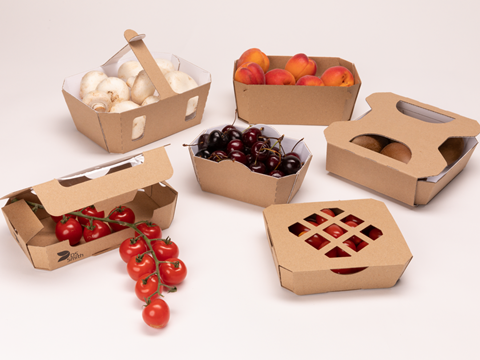
DS Smith reports that it has replaced 1.2 billion pieces of plastic across its European and North American markets, beating its 2025 target sixteen months in advance.
As part of its Now & Next Sustainability Strategy, the company sought to reduce or remove one billion pieces of primary or secondary plastic packaging from its consumer goods by 2025. This applied in twenty-seven countries across Europe and North America, with such plastics as fruit and vegetable punnets, plastic carriers, and shrink wrap for beverage bottles being switched out.
Reportedly, the UK cut down on more plastics than any other country, replacing more than 274 million pieces of plastic with fibre-based alternatives. It was followed by France, which replaced over 260 million pieces; then by Germany with over 153 million pieces.
DS Smith goes on to state that it has almost doubled the amount of plastic pieces replaced in East Europe since it first set the target in 2020.
Its Circular Design Principles and Circular Design Metrics, developed alongside the Ellen MacArthur Foundation, are credited as contributing factors to meeting the 2025 target. The latter has been applied across various sectors, including retail goods, food and beverages, automotive parts, and industrial devices.
Meanwhile, every DS Smith designer is said to be trained in its Circular Design Principles to partner with customers and assess performance against recycled content and recyclability, indicative estimated CO2 emissions, levels of excess waste, supply chain waste, and other factors.
“When we set our Now and Next sustainability strategy, we wanted to include goals that delivered environmental change beyond as well as within DS Smith,” said Miles Roberts, group chief executive at DS Smith. “By innovating to help our customers replace or reduce plastics, we are responding to societal demands to reduce plastic pollution, as well as growing our partnerships with customers. I am proud of every single member of the DS Smith team for achieving this goal, and a year early.
“However, this is very much the beginning. There are many more positive impacts we can make by supporting our customers and communities in their sustainability goals and we are extremely motivated by this mission.
“But it is important to note that if our customers – the biggest FMCG brands – are to remove plastics at scale and at pace, they need the right regulatory framework around them. What we need are stronger, harmonized, global, regulations that level the playing field, to help businesses move away from plastic.”
The news comes after Unilever backed down on its target to halve virgin plastic consumption by 2025. Instead, it now aims to reduce plastics by one-third by 2026, raising concerns that 100,000 additional tons of fresh plastic could be produced annually.
Various industry players have criticized Unilever for this decision, while others feel that re-evaluating sustainability goals is a realistic approach.
Colgate-Palmolive has also expressed that it might miss its recyclability, reusability, and compostability goals for 2025 – an outcome blamed on “industry-wide challenges” for flexible packaging.
International Paper is in the process of acquiring DS Smith in an all-share combination – yet the deal could be disrupted as Suzano is rumoured to have expressed its interest in an all-cash acquisition of International Paper and is apparently upping its bid.
If you liked this story, you might also enjoy:
How are the top brands progressing on packaging sustainability?
The ultimate guide to global plastic sustainability regulation














No comments yet